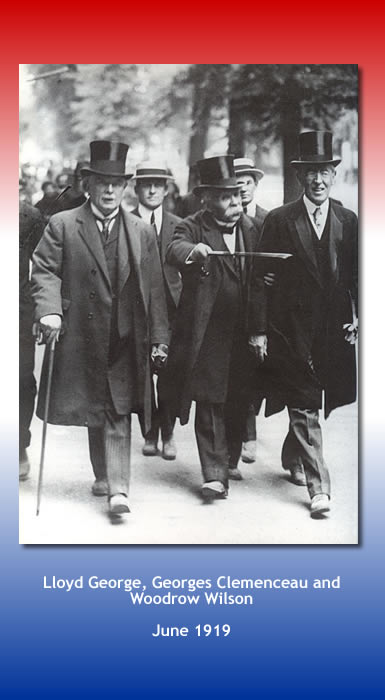Infectious Diseases Case of the Month #21 |
|||
 |
4th of July Special EditionPresident Woodrow Wilson became acutely ill in April 1919 in midst of negotiations that led to the Treaty of Versailles concluding World War I. Hostilities had ended on November 11, 1918 when an armistice had been arranged between Germany and the Allied Powers. Settlement talks that would lead to the Treaty of Versailles began on January 19, 1919. U.S. President Woodrow Wilson became the first sitting U.S. President to travel overseas while in office when he traveled to Paris to participate in the talks. Germany was excluded from the talks until near their conclusion, and Russia was not invited. The talks were dominated by David Lloyd George, Prime Minister of the United Kingdom, Georges Clemenceau, Prime Minister of France, and President Wilson (see photo at left). Wilson, son of a Presbyterian minister and an idealist, favored settlement based on his Fourteen Points (see address to Congress, January 8, 1918) including the idea for an international governing body known as the League of Nations. Clemenceau and Lloyd George, interested in protecting their own national interests and in punishing the Central Powers, opposed many of Wilson's idealistic proposals. In the midst of difficult negotiations Wilson developed his acute illness. On the evening of April 3rd Wilson was suddenly "seized with paroxysms of coughing, which were so severe and frequent it interfered with his breathing." His physician further noted fever to 103o and profuse diarrhea. For several days he was confined to bed. On day five of his illness, he insisted on resuming the work of peace negotiation receiving Clemenceau and Lloyd George as he lay in his sickbed. He slowly recovered but observers including Herbert Hoover noted a change in Wilson's demeanor and incisiveness after his illness noting loss of mental "resiliency" and obsession with details concerning things of trivial importance. Lloyd George commented on Wilson's "nervous and spiritual breakdown in the middle of the Conference." Still on his sickbed Wilson abruptly yielded to the demands of Clemenceau in respect to settlement issues apparently abandoning principles he had previously insisted on. The resulting agreement led to the The Treaty of Versailles signed by Germany and the Allies on June 28, 1919. Exacting a harsh punishment, the Treaty forced Germany to accept full responsibility and blame for the war. This provided the basis for the astronomical reparations demanded by the Allies (initially 269 billion gold marks). Beyond this, the Treaty gave territory from Germany to a number of surrounding countries, stripped Germany of all overseas and African colonies, and strictly limited its military. The humiliation and economic cost from these demands are often blamed for the failure of the Weimar Republic in 1933 and Hitler's rise to power. Some have speculated that Wilson's acute illness somehow influenced his behavior in compromising with Lloyd George and Georges Clemenceau. If so, the illness has had profound effect on subsequent history. Others have suggested that Wilson's overarching interest in the creation of The League of Nations prompted him to compromise. In a final irony, the U.S. Senate refused to ratify U.S. participation in the League of Nations. |
||
What was the cause of President Wilson's illness? |
|||
 |
President Woodrow Wilson experienced an attack of influenza during the third wave of the 1918 Influenza Pandemic. The Influenza Pandemic of 1918 occurred in three waves, the first in the spring of 1918, the second in the summer and fall of 1918, and the third in the spring of 1919. In general the first and third waves were milder than the second, most lethal wave. However, in places, including Paris, the third wave behaved very aggressively. In February 1919 2,676 Parisians died of the flu; in March another 1517 died. Specific diagnostic tests of course were unavailable at the time, and indeed, the etiologic agent of influenza was then unknown. Nontheless, epidemiologically it was very likely that President Wilson suffered an attack of influenza. Other members of the American peace delegation were also ill at the time. One, a twenty-five year old aid, became ill the same day as the President and died four days later. The President's doctor at first suspected poisoning given the rapid onset of symptoms but quickly concluded that influenza was the likely diagnosis (see letter from Dr. Grayson). That the President's severe illness might have influenced his abilities as a negotiator can only be a matter of speculation. Other speculation is that he may have suffered a "mini-stroke," a prelude to the incapacitating stroke he was to suffer in October 1919. Clearly the beginning of his illness with fevers, paroxysms of coughing, etc. suggests an infectious disease onset however.Woodrow Wilson was among millions of victims of the 1918 Influenza Pandemic, estimated to have killed up to fifty million people worldwide. Unlike seasonal influenza, and other episodes of pandemic influenza, the 1918 strain tended to cause severe illness and death in healthy young adults. Indeed, among others, 621,000 U.S. servicemen became ill with influenza during the epidemic and 43,000 died. Of the other choices listed in the original vignette Streptococcus pneumoniae and Haemophilus influenza (a bacterium erroneously once thought to be the cause of influenza) could have caused acute severe respiratory illness. Salmonella typhi causes an enteric fever syndrome. Mycobacterium tuberculosis would be unlikely to cause a self limited illness such as suffered by President Wilson. Perhaps the outcome of the Paris Peace Talks of 1919 was foreordained given the attitudes and interests of the British and French participants. Still, it is interesting to think how United States and world history could have been different had Woodrow Wilson prevailed and what role infectious disease may have played in the fact that he did not. Happy 4th of July! |
||
| Home Case of the Month ID Case Archive | Your Comments/Feedback | ||